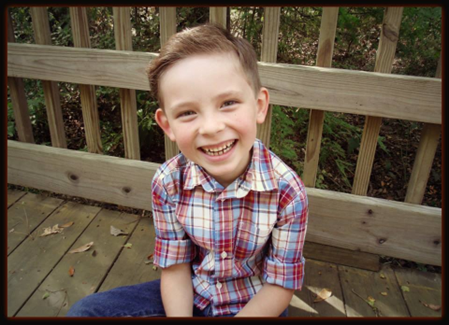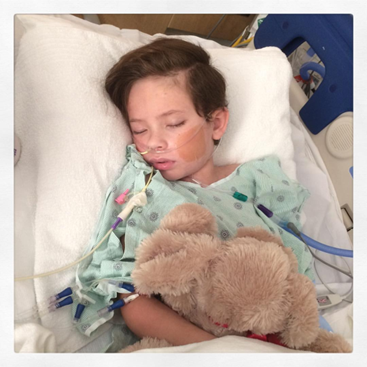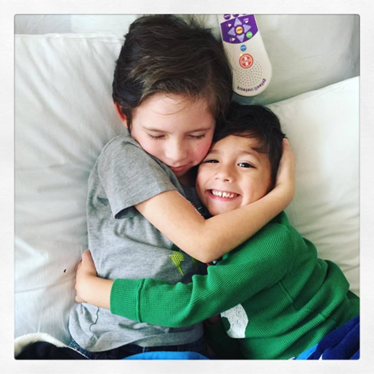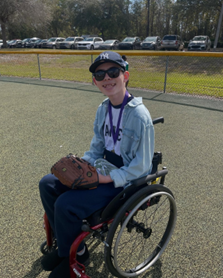David’s Story
David was always a happy-go-lucky kid. He had a witty sense of humor and was a deeply compassionate child. He loved superheroes, especially Batman and Spiderman, and was a big fan of Star Wars. He was the kind of child who could light up a room with his jokes and always made sure others felt included and cared for.
The Acute Phase
In early January 2017, just weeks before his seventh birthday, David came down with what seemed like a typical cold. His younger brother had an earache around the same time, so I took them both to the pediatrician. David was prescribed a cough suppressant, and we carried on, assuming things would improve.
For a short while, they did.
Then, suddenly, everything changed.
After a few days of mild symptoms, David began vomiting and seemed unusually fatigued. The next morning began the most terrifying chapter of our lives.
On January 26, 2017, I walked into his room expecting to find him asleep. Instead, I found him curled into a fetal position, unresponsive to my voice. When he finally opened his eyes, he looked confused and frightened. He didn’t recognize me. He couldn’t walk, couldn’t speak, and couldn’t even acknowledge his own mother.
We rushed to the ER. My husband was overseas on military assignment, and we had no family nearby. I had to carry David in one arm and hold my four-year-old’s hand in the other. By the time we reached the hospital, David was having a seizure in the waiting room. It was the first of many.
That day, David was admitted for emergency care. He was connected to EEGs, IVs, and other monitors. The initial suspicion was viral encephalitis. Thankfully, that night, the military had flown my husband in. Despite extensive testing, including spinal taps and consultations with infectious disease specialists, no clear diagnosis emerged. Over the course of a week, David’s seizures worsened. Eventually, we were transferred to another facility, where doctors believed they could provide more specialized care.
David was life-flighted to Nicklaus Children’s Hospital in Miami. There, he was placed in a medically induced coma to control the seizures. The unofficial diagnosis: Febrile Infection-Related Epilepsy Syndrome, a rare and devastating condition with no known cure.
Over the following weeks, David endured countless procedures, drug regimens, and setbacks. His seizures remained relentless. At one point, doctors warned us that without a breakthrough, David’s heart might stop, or he might remain in a vegetative state indefinitely.
That’s when we were offered the opportunity to participate in a clinical trial for SAGE-547. It was a double-blind study, so we never knew whether David received the trial drug or a placebo. But soon after the trial period ended, David’s seizures began to respond to medication.
He was finally waking up.
On March 5, 2017, David emerged from the coma. Miraculously, his personality was still there. He cracked jokes, smiled, and slowly began reconnecting with the world around him.
He started speech and physical therapy and was eventually discharged from the hospital. But while we were relieved to be going home, we quickly realized the journey was far from over.
The Chronic Phase
Today is September 17, 2025, nearly nine years since FIRES changed our lives.
We’ve fought tirelessly to give David the best life possible. But this journey hasn’t just been David’s. It’s been our entire family’s. FIRES doesn’t just affect the individual; it affects siblings, marriages, careers, and day-to-day life in ways that can’t be quantified. David’s story is no longer just his. It is ours. David’s story has become my story. I am his advocate. I am his voice.
It took years to create a personalized care plan for David. Along the way, we learned that there is no “one-size-fits-all” approach to treating chronic FIRES. David doesn’t fit the mold, and no child with FIRES truly does. Each case requires individualized care, deep observation, and relentless advocacy.
Here are a few things I’ve learned, and want other parents, caregivers, and providers to hear:
Parents are experts too. I know David better than anyone else. My observations are data. If you're a parent or caregiver, yours are too.
Track everything. We use the EPSY app to document seizure trends, behavioral changes, and medication effects. Objective data like this can change how doctors treat your child. It can determine whether or not they believe what you say.
Trust your instincts. If something seems off. Whether it’s a side effect or a behavioral shift, document it and speak up.
If you think a certain medication is causing a side effect, you’re likely right. However, doctors may dismiss side effects outside of the “standard” (as many of our loved ones are) if you can’t back it up with peer-reviewed research. Learn how to find credible, peer-reviewed studies to strengthen your case.
Advocate fiercely. Too often, caregivers are dismissed. Don’t let anyone minimize your experience or expertise.
FIRES is unpredictable. What works for one child may not work for another. Be flexible and persistent in finding the right care balance.
Drug Withdrawal
There is one last issue I feel deeply compelled to bring to light: children enduring drug withdrawal at home.
As part of his medical journey, David has had to taper off several powerful medications. Each withdrawal came with intense, sometimes frightening symptoms- episodes that no child should ever have to endure without medical support. And yet, like so many families, we were left to manage it on our own. At home. Without medical supervision. His younger brother saw it. We all lived it. This is something that remains overlooked because it goes against the “standard.” Families taper off medication slowly following their provider’s directions, yet still observe severe drug withdrawals in their loved one.
This is a systemic gap in care.
No child should be forced to navigate the physical and emotional toll of withdrawal from potent pharmaceuticals without access to a safe, specialized rehabilitation environment. No family should have to shoulder that burden alone.
We must do better.
I urge healthcare providers and institutions to develop targeted solutions- rehabilitation centers designed specifically for medically complex children who have been prescribed these medications as part of life-sustaining treatments. These centers must be staffed with professionals who understand the unique needs of chronically ill children. Trained staff should be available to monitor for serious complications like seizures and to offer both clinical care and emotional support throughout the process.
There must be a better alternative than expecting families to manage pediatric drug withdrawal alone, often for months at a time, under conditions that can destabilize the entire household.
David, and every child like him deserves better.
Life Today
David is now 15, almost 16. He was recently diagnosed with Autism and Major Neurocognitive Disorder, both secondary to FIRES. Despite everything, he continues to be the funny, kind-hearted, superhero-loving kid he’s always been.
He’s homeschooled for medical reasons, participates in the Miracle League, and enjoys weekly outings with a neurodivergent homeschool group. He loves stuffed-crust pizza, Sprite, and talking about his favorite movies.
Most importantly, we’re in a place now where David is happy and often goes around 30 days without a seizure, a quality of life/seizure control balance we never thought possible in the early days.
David’s happiness and quality of life matter to me just as much as seizure control. He’s been through so much in his life. Whether he meets the same milestones as other children his age is of no concern to me. What matters to me is that he is happy, and as healthy and well-functioning as HE can be.
Miracle
David’s life is a miracle. Every seizure-free moment, every moment of happiness. That’s why I recently wrote a song called Miracle. This song was written about David, but is for all those living with chronic illness or exceptional abilities. Their lives are worthy of love.
Please consider donating to the NORSE Institute to help fund vital research for patients like David. Your support could bring us one step closer to answers and to a future where no family has to walk this road alone.




